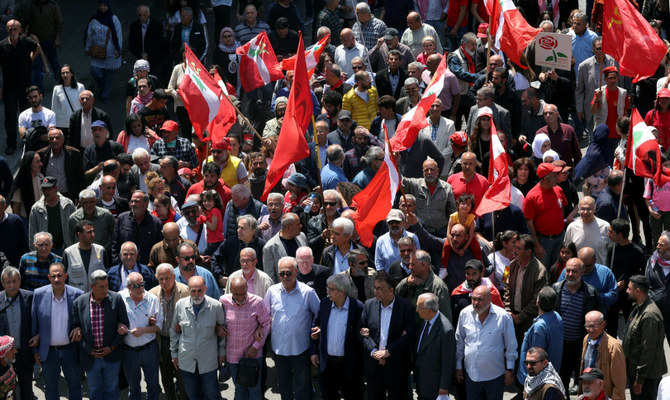BEIRUT: Hundreds of Lebanese workers, unionists and foreign female workers in the country responded to calls to protest as part of the Labor Day activities on Monday, which was International Workers’ Day.
Two major protests took place in Beirut, the first by the National Federation of Worker and Employee Trade Unions in Lebanon, also known as FENASOL, and the second by the Lebanese Communist Party. The protesters assembled in Martyrs’ Square after marching through the city’s streets, amid tight security measures.
“My salary has died,” read one banner. Another said: “The nation is for the rich and nationalism is for the poor.” Other banners called for “the right to health and social security.” The Lebanese Communist Party raised a banner calling for greater “independence of the labor movement and the protection of public freedoms.”
Castro Abdullah, the president of FENASOL, criticized “Lebanon’s subjugation by its government to the International Monetary Fund's dictates.”
He added that “the country is looted and stolen but not bankrupt” and called on “all forces, labor unions and public administration employees to unify their words and positions to escalate the comprehensive confrontation against the government and reach a declaration of a comprehensive civil disobedience in all of Lebanon.”
Representatives of rights organizations, including the Kurdish Newroz Cultural and Social Association, and the Casual Workers’ League, spoke during the rally in Martyrs’ Square. A representative of foreign female workers called for an end to their exploitation.
Clashes broke out during the two protests after a group of demonstrators raised a banner that read: “No safe return for Syrian refugees to Syria with the presence of Bashar Assad (regime).” Tensions run high in Lebanon over the issue of Syrian immigrants. Many Lebanese say they have become “an economic burden” and some have demanded that they return home.
Some protesters from the Lebanese Communist Party seized the banner and said “the timing is not appropriate for raising slogans related to refugees or Assad.” Riot police intervened to break up the fighting.
Lebanon continues to suffer from catastrophically high unemployment and inflation, and a largely unorganized labor force, amid a dramatic deterioration in living conditions during which many workers have slipped below the poverty line.
According to official figures from the Central Administration of Statistics and the International Labor Organization, the unemployment rate in Lebanon rose from 11.4 percent in 2018 to 29.6 percent in early 2022, amid a severe economic crisis that began in 2019. About 47.8 percent of unemployed Lebanese are between the ages of 15 and 24, according to official statistics.
Information International, an independent regional research and consultancy firm, estimated Lebanon's unemployment rate to be even higher, about 38 percent.
According to these statistics, about 60 percent of all workers in the country are estimated to be part of the unorganized labor force.
In a message to the Lebanese people, Najib Mikati, prime minister of the caretaker government, said: “We are aware of the difficult circumstances you are living in and we appreciate the sacrifices you make to preserve the state’s entity, institutions and administrations.
“The recent measures taken by the government are only a small part of what you deserve but the resources that you know have made it inevitable that the benefits are provided in the best way possible. With mutual understanding, we hope to reach gradual and more equitable solutions that ensure you a decent living.”
Ten days ago, the Lebanese Cabinet issued a decree that included an increase of the official minimum wage from 2.5 million to 9 million Lebanese pounds. However, according to Bechara Asmar, the head of the General Confederation of Lebanese Workers, even this increased salary, equivalent to about $90 based on the readily available exchange rate, is not enough for a person to live on, let alone a family.
“This year’s Labor Day is the worst in decades, as the situation of Lebanese workers is catastrophic, and we warn of famine looming on the horizon amid the continued collapse of the state and the economy,” said Asmar.
“The salary increases that we are striving to achieve may lose their value with any new increase in the exchange rate of the dollar on the black market.”
He also warned of “the collapse of social security funds, which are important for providing a large percentage of the cost of healthcare for workers and employees.”
















